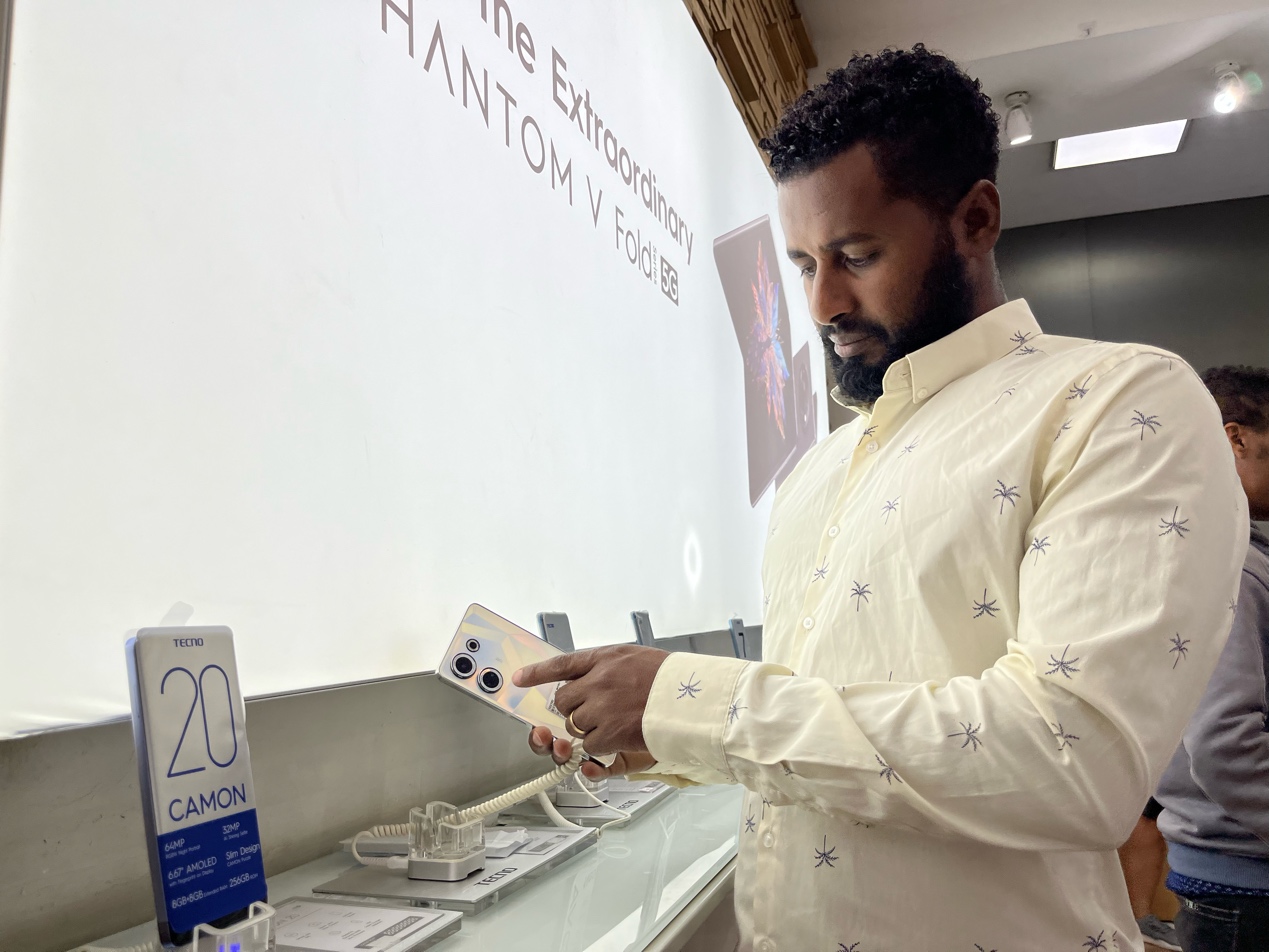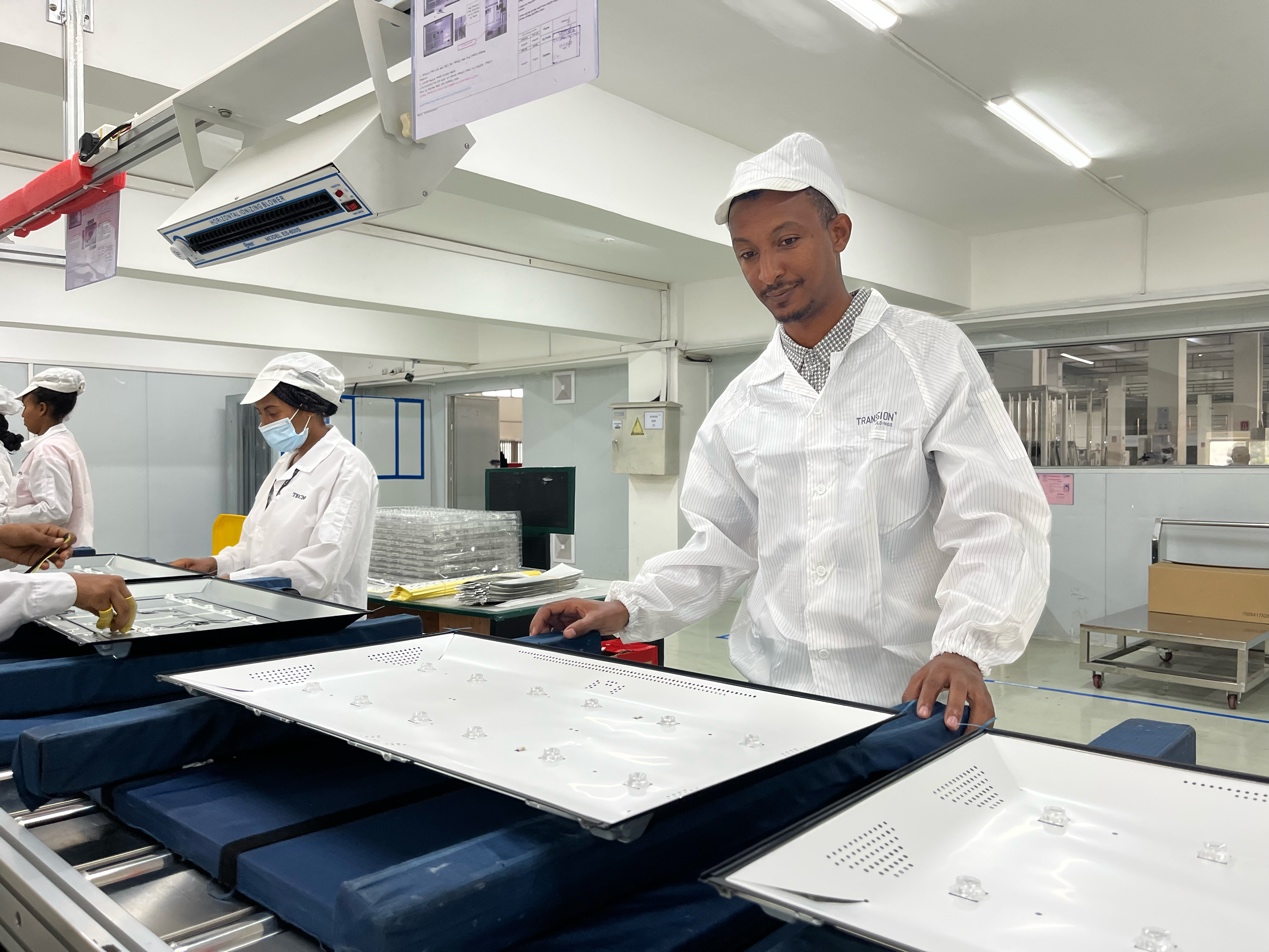“Together we can”: Chinese tech behemoth oils the wheels of African digital revolution

People dance on a municipal plaza in Addis Ababa, Ethiopia's capital city. Many dancers play music on their Chinese phones. Photo by Chi Zao.
Teenagers in Addis Ababa, Ethiopia, dance cheerfully to the beat of the music from their cell phones in a city plaza. Passengers wait for the train at a small station in Djibouti City, Djibouti, killing time with smartphone games. Farmers in Abuja, Nigeria, film their daily work with mobile phones and post the footage online.
Africa, home to the world's youngest population, has been an active participant in the ongoing global digital revolution. A major contributor to this effort is Transsion Holdings, a Chinese mobile phone manufacturer that has dominated the African smartphone market with feature-rich devices explicitly tailored to the needs of African users.
According to Canalys, Transsion, parent company of the TECNO, Infinix, and itel brands, led the African smartphone market in the second quarter of 2023, accounting for 54% of the total. TECNO was placed ninth on African Business' 2023 list of Africa's 100 most admired brands, Infinix was ranked twenty-ninth, and itel was ranked thirtieth.
"I've been using Transsion's phone since 2013. To ensure that no one in Africa is left behind in the digital transition, the Chinese company has made their phones accessible to even the lowest-income citizens," said Michael Abebe, a 27-year-old Ethiopian digital enthusiast, adding that the cheapest Transsion phone goes for as little as 10 dollars.
Making mobile phones for Africans

TECON’s Addis Ababa sales manager, Shewangizaw Berhane, demonstrates the newest smartphone model. Photo by Chi Zao.
Although the mobile phone market in Africa is massive, only a few international brands have expanded to serve local consumers, as many Africans on tight budgets cannot afford the high price of smartphones.
Transsion is an exception. It is virtually unknown in China, and since its first mobile phone was released in 2007, each of its phones has been first released in the African market and aimed at African consumers.
The Chinese company sold 156 million mobile phones in 2022 and accounted for 11.7% of the global market share, with its smartphone shipments ranking first in Africa. Throughout Ethiopia, the brand can be found in over 300 branded stores and over 1,000 key retailer outlets.
"Transsion's success in Africa is a model case of a company that has nailed the specific needs of African customers. Our phones are more reasonably priced than competing foreign manufacturers’ and include many features designed specifically with African consumers in mind," said Shewangizaw Berhane, a 35-year-old sales manager for TECNO in Addis Ababa.
In most of Africa, where a tropical climate is common, mobile phones come into closer contact with users’ sweat. Human sweat is a mild acid with a PH value between 4.5 and 7. Transsion has developed an acid-proof coating for mobile phones that protects them from additional damage and extends their useful lives. It also guarantees that the phone’s fingerprint recognition feature continues to function normally even when the temperature outside is high.
Transsion has not only developed ways to extend the life of mobile phones, but also studied the local market and developed features that can help Africans save more money. Because many African countries are only getting started on their internet infrastructure, mobile phone consumers have few options and high data transfer costs. To improve and reduce the cost of internet access for people in Africa, the company has created cutting-edge technologies that can save data and maintain a stable connection even when the internet signal is poor.
“While most mobile tech giants focus on fancy functions for wealthy clients, the Chinese brand stresses valuable features that help Africans save money. This is one of the reasons why the Africans love this brand so much,” said Berhane.

Transsion's feature camera technology has thoroughly considered African people's skin tones and facial features, making its mobile phones very popular among African youth.
Transsion has also implemented cutting-edge technologies to enhance its African consumer service. Its smartphones now include AI voice services and keyboards for numerous African languages, and its cameras have been adjusted to better capture darker skin tones, allowing young Africans to create higher-quality photos and videos.
“The beauty filters on most smartphones have one primary purpose: to make your skin tone and facial features look lighter and whiter. Using its own innovative algorithm, Transsion has created filters that lighten the skin while retaining our black or brown undertones. The improved facial recognition for Africans also makes it simpler for us to record ourselves,” said Abebe.
“This Chinese brand has shown genuine respect for Africa, giving us a leg up in the digital revolution sweeping the globe,” he added.
Together we can: technological transfer makes Africa develop

Nibret Ayalew, 35, a production manager at Transsion Ethiopia for almost 11 years, introduces new technology to local youth. Photo by Chi Zao.
Transsion's success in Africa is attributable to the company's dedication to localization and its recruitment of African talent. Of the more than 400 people it employs at its mobile phone plant in Ethiopia, only four are Chinese. Most of the factory's administrators and chief engineers are locals.
Nibret Ayalew, 35, has been a production manager with Transsion Ethiopia for over 11 years. After earning his computer science degree from Admas University, he sought employment with Transsion to positively impact Ethiopia's technological advancement.
"The Chinese firm's motto is 'Together we can.' Ethiopia can accelerate its industrial and economic development by working with Chinese tech titans. Ethiopians like me can gain exposure to cutting-edge knowledge that will help us move further," said Nibret.
Nibret was awarded a Chinese government scholarship to visit Beijing for three months in 2018 and was then funded by Transsion to visit its headquarters in Shenzhen for one month in 2020. His time in China reaffirmed his conviction that the two countries could partner up to improve life in Africa, and he recognized the significance of technology transfers to Ethiopia's long-term progress.
“The value of technology has become more apparent to me after visiting China. Transsion has been constructing factories throughout Africa and exporting such technologies to Ethiopians like me. I believe this will help my country create its industrial base while giving employment prospects to over 70,000 Ethiopian university graduates yearly,” said Nibret.
According to Lou Xiaopeng, director of Transsion's Ethiopian factory, introducing technologies to locals like Nibret is the best way to hasten the digital revolution in Africa.
Transsion has promoted more Ethiopians to prominent positions in order to attract more Ethiopian talent to the Chinese corporation. There used to be twenty Chinese managers at this Ethiopian factory, while today there are just four.
"Africa's future is dependent on African youth. We have trained many local experts like Nibret, hoping they can play a significant role when we build more factories in other African countries, bringing technological advancement to more African nations," said Lou.
Photos
Related Stories
- China-aided riverside green development project expected to improve living environment of Addis Ababa
- Putting China-Zambia ties in top gear
- Former Ethiopian president asserts Ethiopia's commitment to ensuring Belt and Road's success
- Ethiopian girl shows you behind Chinese leading design firm in Africa
- Chinese firms offer donations to needy locals as Ethiopian New Year approaches
Copyright © 2023 People's Daily Online. All Rights Reserved.









